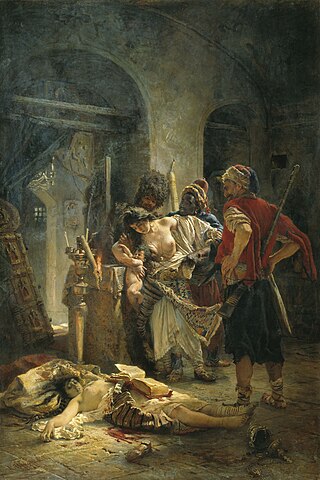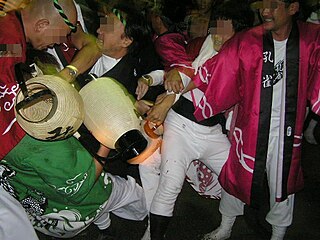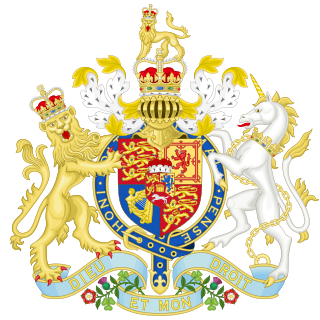
Sacrilege is the violation or injurious treatment of a sacred object, site or person. This can take the form of irreverence to sacred persons, places, and things. When the sacrilegious offence is verbal, it is called blasphemy, and when physical, it is often called desecration. In a more general sense, any transgression against what is seen as the virtue of religion would be a sacrilege, and so is coming near a sacred site without permission.
Perverting the course of justice is an offence committed when a person prevents justice from being served on themselves or on another party. In England and Wales it is a common law offence, carrying a maximum sentence of life imprisonment. Statutory versions of the offence exist in Australia, Canada, Ireland, and New Zealand. The Scottish equivalent is defeating the ends of justice, although charges of attempting to pervert the course of justice are also raised in Scotland, while the South African counterpart is defeating or obstructing the course of justice. A similar concept, obstruction of justice, exists in United States law.
Blasphemous libel was originally an offence under the common law of England. Today, it is an offence under the common law of Northern Ireland, but has been abolished in England and Wales, and repealed in Canada and New Zealand. It is a form of criminal libel that consists of the publication of material which exposes the Christian religion to scurrility, vilification, ridicule, and contempt, with material that must have the tendency to shock and outrage the feelings of Christians.
Concealment of birth is the act of a parent failing to report the birth of a child. The term is sometimes used to refer to hiding the birth of a child from friends or family, but is most often used when the appropriate authorities have not been informed about a stillbirth or the death of a newborn. This is a crime in many countries, with varying punishments.

The Offences against the Person Act 1861 is an Act of the Parliament of the United Kingdom of Great Britain and Ireland. It consolidated provisions related to offences against the person from a number of earlier statutes into a single Act. For the most part these provisions were, according to the draftsman of the Act, incorporated with little or no variation in their phraseology. It is one of a group of Acts sometimes referred to as the Criminal Law Consolidation Acts 1861. It was passed with the object of simplifying the law. It is essentially a revised version of an earlier consolidation act, the Offences Against the Person Act 1828, incorporating subsequent statutes.

Brawling, in law, was the offence of quarrelling, or creating a disturbance in a church or churchyard. Brawling was covered in ecclesiastic courts until 1860. It has rarely been prosecuted since then.

The Act of Uniformity 1548, the Act of Uniformity 1549, the Uniformity Act 1548, or the Act of Equality was an Act of the Parliament of England, passed on 21 January 1549.

The Malicious Damage Act 1861 is an Act of the Parliament of the United Kingdom of Great Britain and Ireland. It consolidated provisions related to malicious damage from a number of earlier statutes into a single Act. For the most part these provisions were, according to the draftsman of the Act, incorporated with little or no variation in their phraseology. It is one of a group of Acts sometimes referred to as the Criminal Law Consolidation Acts 1861. It was passed with the object of simplifying the law. It is essentially a revised version of an earlier consolidation Act, the Malicious Injuries to Property Act 1827, incorporating subsequent statutes.

The Criminal Law Act 1967 is an Act of the Parliament of the United Kingdom that made some major changes to English criminal law, as part of wider liberal reforms by the Labour government elected in 1966. Most of it is still in force.

The Infanticide Act 1938 is an Act of the Parliament of the United Kingdom. It creates the offence of infanticide for England and Wales.
Blasphemy is not a criminal offence under Australian federal law, but the de jure situation varies at state and territory level; it is currently not enforced in any Australian jurisdiction. The offences of blasphemy and blasphemous libel in English common law were carried over to the Australian colonies and "received" into state law following Federation in 1901. The common-law offences have been abolished totally in Queensland and Western Australia, when those jurisdictions adopted criminal codes that superseded the common law. In South Australia, Victoria, and the Northern Territory the situation is ambiguous, as the local criminal codes do not mention blasphemy but also did not specifically abolish the common-law offences. In New South Wales and Tasmania, the criminal codes do include an offence of blasphemy or blasphemous libel, but the relevant sections are not enforced and generally regarded as obsolete.

The Forgery Act 1861 is an act of the Parliament of the United Kingdom of Great Britain and Ireland. It consolidated provisions related to forgery from a number of earlier statutes into a single Act. For the most part these provisions were, according to the draftsman of the Act, incorporated with little or no variation in their phraseology. It is one of a group of acts sometimes referred to as the Criminal Law Consolidation Acts 1861. It was passed with the object of simplifying the law. It is essentially a revised version of an earlier consolidation act, the Forgery Act 1830, incorporating subsequent statutes.

The Accessories and Abettors Act 1861 is a mainly repealed Act of the Parliament of the United Kingdom of Great Britain and Ireland. It consolidated statutory English criminal law related to accomplices, including many classes of encouragers (inciters). Mainly its offences were, according to the draftsman of the Act, replacement enactments with little or no variation in phraseology. It is one of a group of Acts sometimes referred to as the Criminal Law Consolidation Acts 1861. It was passed with the object of simplifying the law. It collected the relevant parts of Peel's Acts and others.
The publishing of any "blasphemous libel" was a crime in New Zealand under Section 123 of the Crimes Act 1961 which allowed for imprisonment for up to one year. However, Section 123 protected all publications and opinions on any religious subject expressed in good faith and decent language against prosecution and specified that prosecution may proceed only with the leave of the attorney-general.
Aiding and abetting is a legal doctrine related to the guilt of someone who aids or abets another person in the commission of a crime. It exists in a number of different countries and generally allows a court to pronounce someone guilty for aiding and abetting in a crime even if he or she is not the principal offender. The words aiding, abetting and accessory are closely used but have differences. While aiding means providing support or assistance to someone, abetting means encouraging someone else to commit a crime. Accessory is someone who in fact assists "commission of a crime committed primarily by someone else". However, some jurisdictions have merged being an accessory before the fact with aiding and abetting.

The Unlawful Drilling Act 1819, also known as the Training Prevention Act is an Act of the Parliament of the United Kingdom. It was one of the Six Acts passed after the Peterloo massacre.
Causing bodily harm by wanton or furious driving is a statutory offence in England and Wales and Northern Ireland. It has been abolished in the Republic of Ireland.

The Criminal Law Act 1826 is an Act of the Parliament of the United Kingdom. It was a consolidation Act. It consolidated a large number of Acts relating to criminal procedure. It was due to Sir Robert Peel.

The Piracy Act 1850, sometimes called the Pirates Repeal Act 1850, is an Act of the Parliament of the United Kingdom. It relates to proceedings for the condemnation of ships and other things taken from pirates and creates an offence of perjury in such proceedings.

The Forgery of Foreign Bills Act 1803 was an Act of the Parliament of the United Kingdom. Prior to its repeal in 2013, it created offences of forgery of foreign instruments in Scotland.







